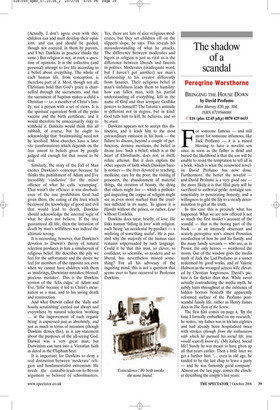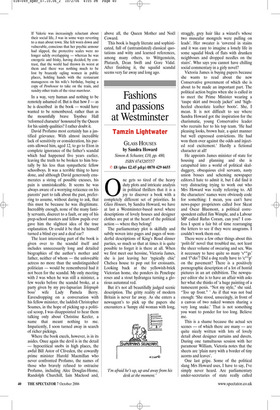The shadow of a scandal
Peregrine Worsthorne
BRINGING THE HOUSE DOWN by David Profumo John Murray, £20, pp. 304, ISBN 0719566088 ✆ £16 (plus £2.45 p&p) 0870 429 6655 For someone famous — and still more for someone infamous, like Jack Profumo — it is a mixed blessing to have a novelist son since as soon as the father is dead and buried the likelihood is that the son will be unable to resist the temptation to tell all in a book, which is what the renowned novelist David Profumo has now done. Furthermore, the better the novelist and David Profumo is a very good one the more likely it is that filial piety will be sacrificed to authorial pride; nostalgic sentimentality to penetrating honesty; and a willingness to gild the lily to a steady determination to get at the truth.
In this case this is precisely what has happened. What we are now offered is not so much the first insider’s account of the scandal — that is the boring part of the book — as an intensely observant and acutely perceptive son’s almost Proustian recollection of how he and his family, and the many family servants — who are, as in Proust, the only heroes — weathered the storm. Out of the window goes the media myth of Jack the Lad Profumo as a sinner redeemed by good works, and of Valerie Hobson as the wronged actress wife elevated by Christian forgiveness. David’s picture is far darker than that. While never actually contradicting the media myth, he subtly hints throughout at the existence of hidden horrors beneath the apparently reformed surface of the Profumo postscandal family life, rather as Henry James does in The Turn of the Screw.
The first hint comes on page 4. ‘By the time I formally embarked on my research,’ he writes, ‘my father was in his late eighties and had already been hospitalised twice with strokes (though from the enthusiasm with which he pursued his social life, you would scarcely know it).’ (My italics). Social life? Surely he was meant to have given up all that years earlier. Then a little later we get a further hint: ‘... even in old age, he tended to be the last chap to leave a party — and he was famously good company’. Almost on the last page, comes the clincher describing the couple’s last years: If Valerie was increasingly reluctant about their social life, J was in some ways reverting to a man about town. She felt worn down and vulnerable, conscious that her psychic armour had slipped, the protective scales were no longer safely overlapping — whereas he was energetic and frisky, having decided, by contrast, that the world had thrown its worst at them and there was nothing much to be lost by brazenly ogling women in public places, holding hands with the restaurant manageress on his wife’s birthday, buying a copy of Penthouse to take on the train, and sundry other traits of the vieux marcheur.
In a way, very human and nothing to be remotely ashamed of. But is that how J — as he is described in the book — would have wanted to be remembered, rather than as the mournfully brave Toynbee Hall ‘reformed character’ honoured by the Queen for his saintly qualities? I rather doubt it.
David Profumo most certainly has a justified grievance. With almost incredible lack of sensitivity or consideration, his parents allowed him, aged 12, to go to Eton in complete ignorance of the father’s scandal which had happened five years earlier, leaving the truth to be broken to him brutally by his less than sympathetic fellow schoolboys. It was a terrible thing to have done, and although David generously enumerates a string of possible excuses, his pain is unmistakeable. It seems he was always aware of a worrying reticence on his parents’ part to talk about the past, preferring to assume, without daring to ask, that this must be because he was illegitimate. Incredibly enough, none of the many family servants, discreet to a fault, or any of his prep-school masters and fellow pupils ever gave him the slightest idea of the true explanation. Or could it be that he himself turned a blind eye and a deaf ear?
The least interesting part of the book is given over to the scandal itself and includes unnecessarily long and detailed biographies of the author’s mother and father, neither of whom — the unloveable actress no more than the undistinguished politician — would be remembered had it not been for the scandal. My only meeting with J was when he was still a minister, a few weeks before the scandal broke, at a party given by my pre-lapsarian Telegraph boss’ wife Lady Pamela Berry. Eavesdropping on a conversation with his fellow minister, the laddish Christopher Soames, in the hope of picking up a political scoop, I was disappointed to hear them talking only about Christine Keeler, a name that meant nothing to me. Impatiently, I soon turned away in search of richer pickings.
Where the book excels, however, is in its asides. Once again the devil is in the detail — hypocritical snobs in high places, the awful Bill Astor of Cliveden, the cowardly prime minister Harold Macmillan who never confronted Profumo, the names of those who bravely refused to ostracise Profumo, including Alec Douglas-Home, Randolph Churchill, Iain Macleod and, above all, the Queen Mother and Noël Coward.
This book is hugely literate and sophisticated, full of (untranslated) classical quotations and witty and learned references, among many others, to Wittgenstein, Plutarch, Dean Swift and Gore Vidal. After finishing it, the squalid scandal seems very far away and long ago.



















































































 Previous page
Previous page